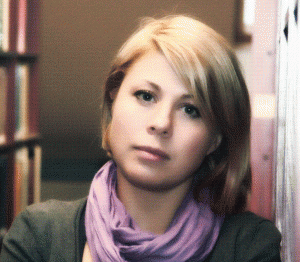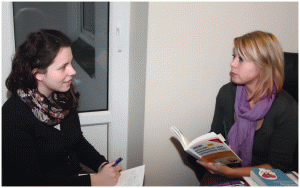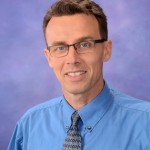Helping university students
 Margarita Pavlovic lives and works in Lithuania, a small country in Eastern Europe. She has been the Director of the Career Development Center at LCC International University since 2008. LCC is a nationally and internationally recognized liberal arts institution that was established in 1991 by a joint venture of Lithuanian, Canadian, and American foundations. LCC has distinguished itself in the region by offering a unique, future-oriented style of education and an interactive academic environment.
Margarita Pavlovic lives and works in Lithuania, a small country in Eastern Europe. She has been the Director of the Career Development Center at LCC International University since 2008. LCC is a nationally and internationally recognized liberal arts institution that was established in 1991 by a joint venture of Lithuanian, Canadian, and American foundations. LCC has distinguished itself in the region by offering a unique, future-oriented style of education and an interactive academic environment.
Margarita has a B.A. in Business Administration and an M.Ed. in Andragogy (Adult Education). Currently, she guides students towards appropriate careers through individual consultation, workshops, and career-related seminars. In addition, she works closely with students helping them find summer employment, internships, etc. She also provides information and advice related to graduate study opportunities in Lithuania and abroad.
She recently took time out of her busy schedule to participate in an online interview.
Q: It has been over 10 years since my wife and I lived in Klaipeda and worked at LCC. How have things changes since then? I understand that there has been a major building project. How many students did you have enrolled this year?
A: LCC always keeps up with the rising external demands through innovation of teaching methods and modernization of infrastructure. Our physical environment i.e. study facilities, dormitories, gym, fitness center, etc. is probably the best in Lithuania. Just recently we received an European Union grant to install a new IT system, replace our whiteboards with interactive smart boards, and buy 100 computers for students and faculty. At the moment we have 650 students. We typically enroll around 130-150 new students each year. LCC is a unique transformational place which only exists because of the people investing their time and money in it. We all are very thankful to people around the world for their constant contribution to the development of LCC and support of its Christian mission. Those who are interested in knowing more about opportunities to get involved, could read more here. In the fall, we celebrated the 20th anniversary. This was a very beautiful celebration with numerous events which emphasized our cultural diversity.
Q: As the Director of the Career Development Center at LCC, to what extent to you emphasize the process of self-discovery? Do you think that this is more of a North American emphasis, or do you see it as an important part of the career development process?
A: When we talk about our careers, we often forget the most important part, the self-knowledge part. Self-discovery is the foundation of career planning. Knowing what you are good at, and what you enjoy doing, will help you not only be successful but also actually love what you do. Since career counselling was started by Frank Parsons in North American, in the beginning of the last century, I believe it [self-discovery] received more attention in North America. Europe, however, has been quite successful at adapting good practices. As a result of one of the EU funded projects on career guidance in Lithuania, three career-planning resources were published. The first one was a book called The Discovery of Self. So I do believe that we are moving in the right direction.
Q: Students and faculty come from a variety of countries to study and work at LCC. In your experience, is a cross-cultural environment positive or negative, or a bit of both, when it comes to career and life preparation? How common is it for your graduates to go on to work in cross-cultural environments?
A: Currently, we have more than 25 countries represented. A cross-cultural environment opens a variety of opportunities, but it also demand more from people. This kind of setting helps to develop strategic skills such as tolerance, conflict management, the ability to write and speak in foreign languages, professional knowledge of other countries, knowledge of cultural differences. This is a place where you can learn how to work together with a variety of people. These competencies are necessary for a successful career, especially in a modern globalized world. Since are grads are fluent in English, they quite frequently get jobs in international companies in Lithuania. Since the economic situation in Lithuania deteriorated after the 2008 economic crisis, many have emigrated to Ireland and the UK.
Q: Do North Americans students or staff ever drive you crazy? I wouldn’t be surprised at all if some of us did.
A: I think that Americans drives us crazy less than we do Americans. After all, it’s a new environment for you. There are funny things that everybody jokes about. Americans wear flip-flops and shorts all year round. Families that come with little kids often get told off by babushkas on the street, for not dressing their kids warm enough. Americans often express their appreciation for your work more freely and more often than Lithuanians. I can also see how Americans struggle with old Soviet systems when dealing with visas, etc. But in general, I think they get integrated quite quickly. To Americans, we seem less talkative or too straightforward, which sometimes could sound impolite. We do not open up as quickly for many reasons; it is a cultural thing. And since we [Lithuanians] are the only permanent staff here, we watch North Americans come and go every year. We do not have enough time to get to know each other really well.
Q: Why did you choose to study at LCC International University? What did you enjoy? What did you find difficult? And how did you go about making your significant career decisions?
Self-discovery is the foundation of career planning. Knowing what you are good at, and what you enjoy doing, will help you not only be successful but also actually love what you do
Q: Looking back, what – if anything – would you do differently?
A: If I could go back, I would probably go into health care; this is where my natural ability and interest is. I was exceptionally good at chemistry and biology in school, and my leisure reading included books on disease diagnosis. Even now, I like to read medical publications and know quite a lot about this area. Health care is all about helping people. That is what I really like to do.
Q: How did you become the Director of the Career Development Center? How important is it to be multi-lingual in your position?
A: It was a big psychological transition for me. The career model which was present in the USSR emphasized having one job for a lifetime. My parents had worked in the same company for over 30 years, and they “injected” their understanding of a career – a ladder you climb in one organization for years. Most people I know, who are over 40, would only change jobs if they were fired. This fear of the unknown is so strong that people are not exploring new career opportunities. Of course, you have to understand that the word “career” generally had a negative connotation. The interests of the Communist Party and the demands of the economy were more important than self-fulfillment.
I was quite unsatisfied with the organizational climate in my former organization, and I was looking for a change. My parents were warning me that it is better to be satisfied with what you have than to strive for something ambitious and lose everything. But I decided to apply. I did not even meet the requirements for the position, since I did not have a graduate degree at the time, but I was still offered the position. LCC is a unique environment and completely different from what I was used to with its flexibility, openness, creativity, etc. It was a very positive transition.
Helping students from different countries makes my job fulfilling. Knowing Russian, Lithuanian, and English helps greatly in my work. It is not only the communication part, but also having knowledge of the cultural background, the students bring with them. That is important. I am a Russian who was born in Lithuania and now works in a North American style institution…how much more diverse can I get?
Q: I understand that you are organizing a Career & Business Fair in February 2012. What is the main purpose of this event? How have events like this helped students in the past and why is it important for students to attend?
A: Yes, the event is planned for February 23rd. The main purpose is to bring together the academic and business worlds. An event like this will help students plan their careers and identify the competencies needed to enhance their employability. As well, this fair promotes entrepreneurship by providing SME’s [small and medium enterprises] with opportunities to share their business experience with students who may be thinking about starting their own ventures. Students have opportunities to meet and talk to company representatives in person. They can get answers about the recruitment process, working conditions, organizational climate, and career opportunities; fill out an application form or submit a resume, arrange a job interview, get information about summer employment possibilities in Lithuania and Europe; learn about the benefits offered to young professionals, get information about practicums and internships; learn how to start a business, and check to see if their skills and knowledge meet the demands of the labour market.
Q: You have a variety of interesting career development resources in your library. Which one is your favorite and why?
A: One of my favorite books is The Element: How Finding Your Passion Changes Everything by Sir Ken Robinson. He talks about the importance of finding a career that reflects who you are. He also talks a lot about creativity, which he defines as “being able to come up with an original idea that has value.” Our education system, he says, was designed to satisfy the labour demands of the industrial economy. This kills creativity and has consequences for each person and for society. It is a very inspirational book. While reading, I was very often thinking of myself, not only as an individual but also as a parent. You can also find his talks on TED.
Another very practical book is Career Distinction by William Arruda and Kirsten Dixon. This book is about building a personal brand in order to be competitive in the job market. In fact, each one of us already had a brand whether we want it or not, and it is our duty to take control over it. It also contains a downloadable workbook, which helps you structure the process.
I could also recommend a few online resources I find fun and useful:
- This online identity calculator allows you to get an idea of your online presence. Most employers now “google” candidates, so this is a very useful tool.
- This website allows you to create your own website and market your personal brand.
- This site can help you create a visual resume, more like a diagram of your education, work experience, skills, achievements, etc.
- If anyone is looking for graduate study opportunities in Europe, or scholarship information, this website would be very useful.
Q: By the way, what is TED?
A: TED (Technology, Entertainment, and Design) is a global set of conferences. The talks are offered for free online at TED.com. There are now over 1,050 talks by scientists, entertainers, writers, politicians, artists, etc. They address an increasingly wide range of topics within the research and practice of science and culture. The speakers are given a maximum of 18 minutes to present their ideas in the most innovative and engaging way they can. Past presenters include Bill Clinton, Bill Gates, Salam Khan, Larry page Sergey Brin, Jamie Oliver, and many Nobel Prize winners. If you have not discovered TED, it is about time to do so. My favorite talks include: “Ken Robinson says schools skill creativity”; “Stacey Kramer: The best gift I ever survived”; and “Jamie Oliver’s TED Prize wish: Teach every child about food.” TED is very addictive. Once you discover it, you can’t get enough.
Q: What do you find the most satisfying about the work you do at LCC International University? And, what do you enjoy the most about your place and your country?
A: Of course, the most satisfying part is being able to help people. One personally assessment emphasized my “caring” nature and even proposed a career as a funeral coordinator. There is nothing better than seeing your students succeed, or hearing that what you do matters. I love working in an environment with young, educated, creative, responsible people.
I like Lithuania for its greenness. I love Klaipeda for its seashore and the Sea Festival. Klaipeda offers the comfort of a small town and the opportunities of a big port city. Its unique German heritage architecture, its complicated history, and the special type of people living here, make it an unforgettable experience for visitors.
Q: The seashore…have you been to the Curonian Spit lately? My wife and I always enjoyed going there when we lived in Klaipeda. Beautiful place.
A: We go to Smiltine (the beach on the Curonian Spit) quite frequently in the summer. It always has the cleanest water, the fine sand, and less crowded beaches. Many guests visit the Sea Museum and the Dolphinarium. By the way, the Curonian Spit is recognized as an UNESCO World Heritage Site.
Q: If someone reading this only had a chance to visit one place in Lithuania, where would you recommend they go and why?
A: Definitely Klaipeda…it has little pieces of the whole Lithuania.
Thank you Margarita for your insight and for your time. All the best with your work as the Director of the Career Development Center at LCC International University in Lithuania. Viso gero!
© Career & Life Direction 2011. All rights reserved.

